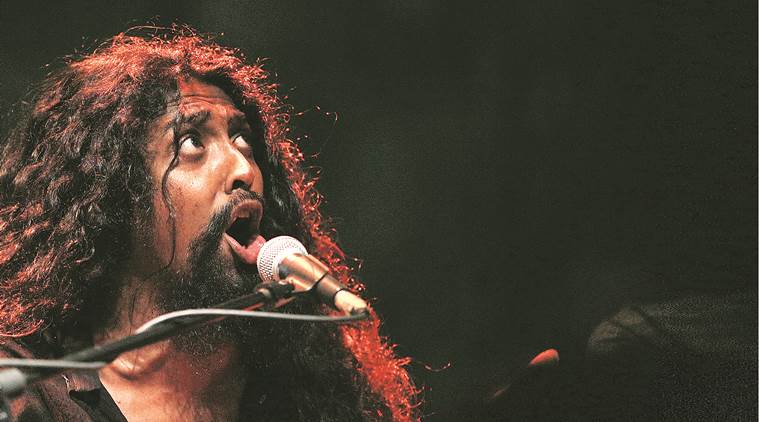Blowin’ in the Wind
Urban folk musician Arko Mukhaerjee on creating a band with guitar giant Amyt Datta, singing tunes that don’t belong to a place and how RD Burman ‘wrongly adapted’ rumba into a ‘sick disco number’
 “I started developing a language that doesn’t belong to a place. I could hear elements of different lands in music…Music is the language of migration. Through it, migration can be expressed,” says Arko Mukhaerjee (Express Photo by Amit Mehra)
“I started developing a language that doesn’t belong to a place. I could hear elements of different lands in music…Music is the language of migration. Through it, migration can be expressed,” says Arko Mukhaerjee (Express Photo by Amit Mehra)
Written by Tanushree Ghosh
If I like a sound I hear, I like to reproduce it. If I can’t, I sing it my way. When I’m singing a Santhali song, I hear Africa,” says Arko Mukhaerjee, 32, at Delhi’s Depot48 before taking the stage with Ziba, his new world music band — a five-piece outfit with guitar legend Amyt Datta as the frontman.
In his songs, Arko seeks a “similar aesthetic”, the one that traverses lands and forms. He sings those that he attempts without changing the texture and gravitas of the original. Imagine Kabir bhajan paired with Mast qalandar, O Susanna! foxtrotting to the dulcet Jaane kahan mera jigar gaya ji and the Nepali folk Resham firiri, a jivey reggae touch to Harry Belafonte’s calypso of an old English rhyme, or a tweaked B-flat in Chuck Berry’s blues standard Johnny B. Goode. The bluegrass notes in many were unmissable, “though I’m not a bluegrass artist, (mandolin player) Diptanshu (Roy) is,” he says speaking about his fellow Fiddler’s Green bandmate. And well, he refuses to call his music fusion. “Indian music changes every 200 kilometres. I was deeply inspired by West African and Irish-Scottish folk, and sang these with puratoni Bangla gaan,” says Kolkata-based curly-haired soi-disant urban gypsy.
Stories prelude Arko’s singing. “The myth comes true for me when I sing,” he says. He is stirred by the phenomenon of Kabir. Predictably, Ziba’s first piece is Kabir jam, a mélange of diverse sounds — rock, jazz, folk and more. Last year, “Amytda called to say ‘let’s make a band together, something carnival-ish’. It was like a call from Miles Davis,” Arko says. He calls it his “golden chance at learning”. “Ziba is more grilling, needs practice, unlike Fiddler’s Green, where we sing impromptu,” he adds.
Datta, who can even make dissonance sound melodic, has been impressed. “For years, I’ve been wanting to create music that is sophisticated and complex yet accessible. Instrumental music is tough to comprehend. Arko is established, just the right person to bring in an Indian voice, not Indian music, but a contemporary face of music,” says Datta.
Arko shares his name with a Bollywood music composer, but similarities end there. The contemporary urban folk musician, with a deep, husky tenor plays the Hawaiian ukulele like an African kora, and the African kazoo — “one of the oldest brass instruments, which looks like a weed chillum,” to the popular Gujarati folk Mero gaam katha pare, for instance.
“If I wasn’t a musician, I would be a mountain guy,” he says. The sense of movement — his mother’s reality of being a 1971 war refugee and him growing up amid Left politics in a lower middle-class refugee colony — informed his music. “I started developing a language that doesn’t belong to a place. I could hear elements of different lands in music — a bit of Persia in India, Punjab and West Africa in Bengal, reggae in Punjabi folk. Music is the language of migration. Through it, migration can be expressed,” says the impressionist musician.
Seven-albums-old, Arko has played in 26 bands around the world including an ethno-electronic collaboration titled Ashram. He began at 11. At 13, he was exposed to heavy metal, and, on his Santiniketan visits, to folk forms of Baul, Bhatiyali, Bhawaiya, Fakiri and Kirtan, among others, and Rabindrasangeet. To him, “the language of Tagore’s simple-chord music was modern — the way it incorporated dhrupad, baithaki, tappa and Middle-Eastern elements”. He adds, “However, by his time, greats like Eddie Durham, Django Reinhardt and Charlie Christian were already in the scene.”
Music began for Arko much before, at home, when he was two. His father would put the boy on his cycle on the way to the market and sing to him. One such song was Shoingey liboh, a tribal folk piece from Manbhum (parts of which are in present-day Purulia, West Bengal), about the sufferings and hopes of the coal miners. He would recreate that years later. He picked up what he heard and started reciprocating to that. His mother, an All India Radio artiste, ensured that her son got the Hindustani classical notes right, not by “sitting all day with the harmonium” though. He learnt it till age 10, returned to singing it at 17-18, but gave up, owing to its “limited, regimented scope”.
In 2001, he began jamming with the students of Datta brothers – Amyt of Pinknoise and Skinny Alley and the late Latin music percussionist Monojit (aka Kochuda). “Here was a conguero playing actual congos, while RD Burman did a rubbish job in Bollywood, wrongly adapting rumba into a sick disco number,” says Arko referring to Monojit who passed away last year. He, however, counts Burman’s father, SD Burman, who roamed the Northeast and brought folk tunes to film music, among his influences, along with Baaba Maal (from Senegal) and Ali Farka Touré (Mali).
He lived in France, from 2011-15, making music with his then partner and harpist Anna Tanvir (daughter of late theatre doyen Habib Tanvir). Their band Crossover performed at many festivals. When they moved to England for their children’s education, he says, “No one knew us. I was busking on streets and found myself in a space where no one looked like me. I thought, ‘let’s confuse these people further’ — someone of my colour, speaking French, singing West African, Afro-Cuban, Spanish and Irish.” Personal and professional life, eventually, hit rock bottom. “I wanted to say a lot but couldn’t in a song,” says Arko, who speaks 19 languages. He did, though, through eight compositions in an animation titled The Lion & The Hamster.
In 2015, Bangladesh changed his economic position. “I was among the top artistes,” says Arko. A docu-series, Vorsha Thakuk Bangla Gaane, concerts at Dhaka Sufi Festival and Nepal Gypsy Jazz Festival helped. In India, he sang in Bangla films, composed jingles, sang the title track of Sourav Ganguly-hosted quiz show Dadagiri and appeared on Sa Re Ga Ma Pa (Zee Bangla). These brought him into Bengali living rooms. He says, “Music takes 200-300 years to turn a page. We are on the verge, just about to turn and witness the drama.”



- 01
- 02
- 03
- 04
- 05
























